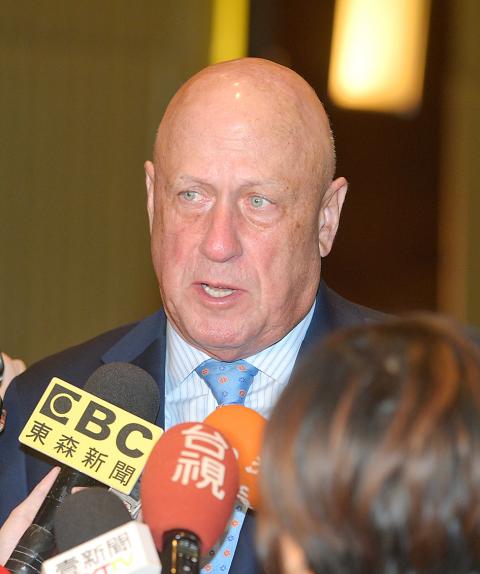Contrary to expectations, the Chinese Communist Party (CCP) is not likely to change its cross-strait policy during its 19th National Congress, which is scheduled to begin on Wednesday, Washington-based Carnegie Endowment for International Peace vice president for studies Douglas Paal said.
Paal, who served as director of the American Institute in Taiwan from 2002 to 2006, yesterday said that he reached the conclusion after speaking with several Chinese officials.
“I have been spending a lot of time trying to talk to people who have Taiwan-related positions in the People’s Republic of China’s official circles. So far they have been more reassuring than frightening in terms of continuity — no big changes,” Paal said on the sidelines of a meeting of Asia-Pacific think-tank leaders in Taipei organized by the Institute for National Policy Research.

Photo: Chang Chia-ming, Taipei Times
However, it remains to be seen whether the officials’ view is in line with that of Chinese President Xi Jinping (習近平), whose mandate is expected to be renewed at the congress in Beijing, he added.
There has been wide speculation regarding how Xi intends to proceed with the Taiwan issue. Some have predicted a hard-line shift, while others have floated the possibility of a military invasion.
In comparison, Paal seemed sanguine about cross-strait development, saying that he hopes Beijing would be willing to work patiently with Taipei and that the Taiwanese government could find a political basis for resuming some of the semi-official connections that were established by the previous Chinese Nationalist Party (KMT) administration.
“But this takes two sides to cooperate and we have to see how [China] develops its leadership and policy during and after the party congress,” he said.
China is overdue in developing better relations with its neighbors, having spent the past 15 years brawling with Japan, Vietnam and most recently India, Paal said.
When asked whether it is feasible for both sides of the Taiwan Strait to engage in friendly interactions and cooperation under the APEC framework, as President Tsai Ing-wen (蔡英文) has suggested, Paal did not give a direct answer.
He instead said he was confident that Xi will “afford respect” to People First Party Chairman James Soong (宋楚瑜), who is set to attend next month’s APEC summit in Da Nang, Vietnam, on Tsai’s behalf.
“It is an opportunity for Taiwan to be represented with all the other nations participating, including [US President] Donald Trump,” he added.
A Taiwanese president has not attended the APEC leadership meeting since the nation became a member of the bloc in 1991 due to obstruction by Beijing.
The highest-level officials to represent the nation’s president at the annual summit were former vice presidents Lien Chan (連戰) and Vincent Siew (蕭萬長) of the KMT.

Several Chinese Nationalist Party (KMT) officials including Chairman Eric Chu (朱立倫) are to be summoned for questioning and then transferred to prosecutors for holding an illegal assembly in Taipei last night, the Taipei Police said today. Chu and two others hosted an illegal assembly and are to be requested to explain their actions, the Taipei City Police Department's Zhongzheng (中正) First Precinct said, referring to a protest held after Huang Lu Chin-ju (黃呂錦茹), KMT Taipei's chapter director, and several other KMT staffers were questioned for alleged signature forgery in recall petitions against Democratic Progressive Party (DPP) legislators. Taipei prosecutors had filed

Taiwan would welcome the return of Honduras as a diplomatic ally if its next president decides to make such a move, Minister of Foreign Affairs Lin Chia-lung (林佳龍) said yesterday. “Of course, we would welcome Honduras if they want to restore diplomatic ties with Taiwan after their elections,” Lin said at a meeting of the legislature’s Foreign Affairs and National Defense Committee, when asked to comment on statements made by two of the three Honduran presidential candidates during the presidential campaign in the Central American country. Taiwan is paying close attention to the region as a whole in the wake of a

NEW WORLD: Taiwan is pursuing innovative approaches to international relations through economics, trade and values-based diplomacy, the foreign minister said Taiwan would implement a “three-chain strategy” that promotes democratic values in response to US tariffs, Minister of Foreign Affairs Lin Chia-lung (林佳龍) said. Taiwan would aim to create a “global democratic value chain,” seek to capitalize on its position within the first island chain and promote a “non-red supply chain,” Lin was quoted as saying in the ministry’s written report to the Legislative Yuan submitted ahead of the legislature’s Foreign Affairs and National Defense Committee meeting slated for today. The Ministry would also uphold a spirit of mutual beneficial collaboration, maintaining close communication and consultations with Washington to show that Taiwan-US cooperation

Taiwan and the US have begun trade negotiations over tariffs imposed by US President Donald Trump earlier this month, Minister of Foreign Affairs Lin Chia-lung (林佳龍) said in an interview this morning before reporting to the Legislative Yuan’s Foreign Affairs and National Defense Committee. The Taipei Economic and Cultural Representative Office (TECRO), Taiwan’s de facto embassy in the US, has already established communication channels with the US Department of State and the US Trade Representative (USTR), and is engaging in intensive consultations, he said. Points of negotiation include tariffs, non-tariff trade barriers and issues related to investment, procurement and export controls, he